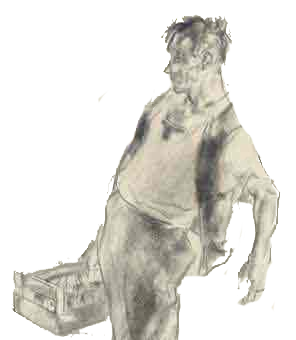From Jerripedia
Dear Parents
- "I received your letter of the 12th May fourteen days after it was dated. I left Guernsey on the 14th of May and arrived in Jersey the same evening. As we were turning a corner of the island of Jersey we met with a ship of war which we did not perceive until we were within a little of her on account of a corner of the island intervening. She fired two guns at us, and we were obliged to steer towards her, uncertain for a little whether we were going to fall into the hands of friends or enemies, She proved to be an English ship.
- "The island of Jersey is considerably larger than the island of Guernsey; it is something of a square form, eight miles one way and four the other; on account of the distance of one side of it from the other, I have not seen very much of the island. Our regiment is situated on the east end of it, opposite to the coast of France. On a clear day I can see with my telescope the houses, trees and hedges on that coast, but I could never distinguish either man or beast. We have sometimes reports of intended invasions here, but as they always turn out to be false we never disturb ourselves about them.
- "The face of both islands is very much the same, only there is more wood in Guernsey than in Jersey. This island, like Guernsey, is all divided into small enclosures of two or three acres of ground and all surrounded with fail dykes or rather dykes of earth, which dykes are planted thick with trees, so that from the roads you can scarcely see thirty yards about you anywhere, and the only view that one can have of the island is from the tops of steeples, from which it appears like a forest so you see nothing but wood.
- "More than one fourth of the inclosures of the island are planted with apple trees under which the cows feed. The apple trees furnish them with cyder which is all their drink, and the branches of the barren wood serve for fuel. There is nothing of what may be called agriculture carried on here. Every man lives in his few acres, which are generally his own, he labours them with his own hands and keeps a horse and two cows. And his wife manages the matters of the house, so that among the common sort there are no servants in Jersey. When a man dies his acres are divided among his children, and in the next generation again are sub-divided. So that everybody has but little, yet everybody is above want. They sometimes feed cattle but their chief animal food is pork. To feed cattle and swine they make use of parsnips, the root of which I am told grows to the bulk of one's thigh.
- "Having trenched the ground with a spade they sow it with parsnips and beans mixed. When the beans are ripe, they pull them and apply them to the feeding of the swine; and after the beans are pulled they feed their cattle by putting them into the field to eat the straws of the parsnips, and after the straws are done they take out the shoots and give them to the swine. They likewise feed their swine on rotten apples; they sometimes give them sour milk and sometimes oats.
- "Evey man has a pig stye. The breed of cattle and swine is large and good, but the breed of horses is very bad. In all their carriages they have an ox between the trams. They have no flax here, but commonly sow a small quantity of hemp to make ropes of. They winnow their corn in a basket made in the form of a pearl shell, about two feet and a half in breadth and four or five feet in length. They hold the broad edge to their breast, and throw up the corn in the air, which falls down again into the basket and the chaff flies away. I am told the women thresh the corn with two sticks fixed together with a string, and they grind the corn without drying it, which is the cause that the meal is very coarse.
- "I have enjoyed my health very well since I came to this island, and live very comfortably. I find the officers generally discreet and civil, and more sober and regular than I expected; tho' custom and their way of life has given them many odd ways of thinking which seem to me unaccountable; the mind seems to be in what the philosophers call a state of nature, without having ever enjoyed the least assistance from instruction or from reflection.
- "When I came to Jersey there was no room for me in the barracks, and I took a room in the neighbourhood at half a crown a week; the Mess here is nine shillings a week. In the morning and at night I live on bread and milk. So that my expenses here are a great deal less than in Guernsey, and I am enabled to live much more at my ease.
- "I have a very good friend in Lieutenant Carnie. He is a plain, upright and serious man, and is himself a proof of the truth of an observation he makes, that the lowest men in the army are often the best. I have taken James Gilchrist's son in Berryhilloch for my servant and he does very well. He tells me that he and his countrymen at Guernsey have wrote to their friends and I believe they are very well. "
Jersey, July 13th 1781

